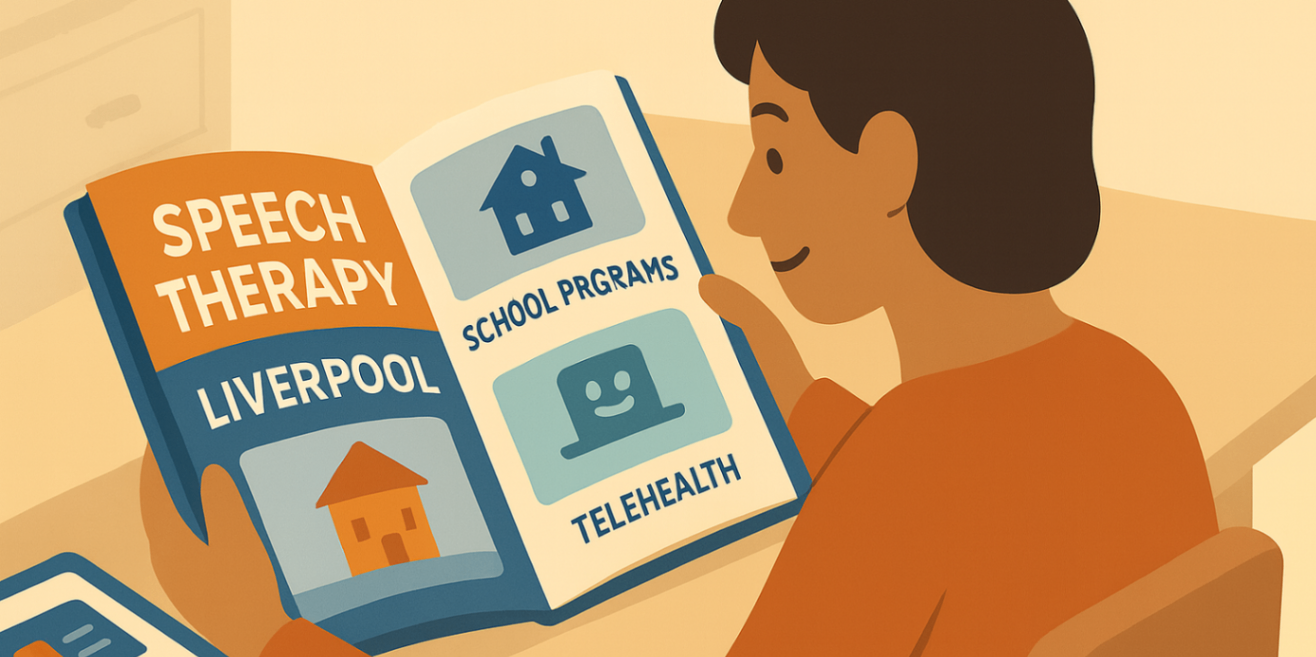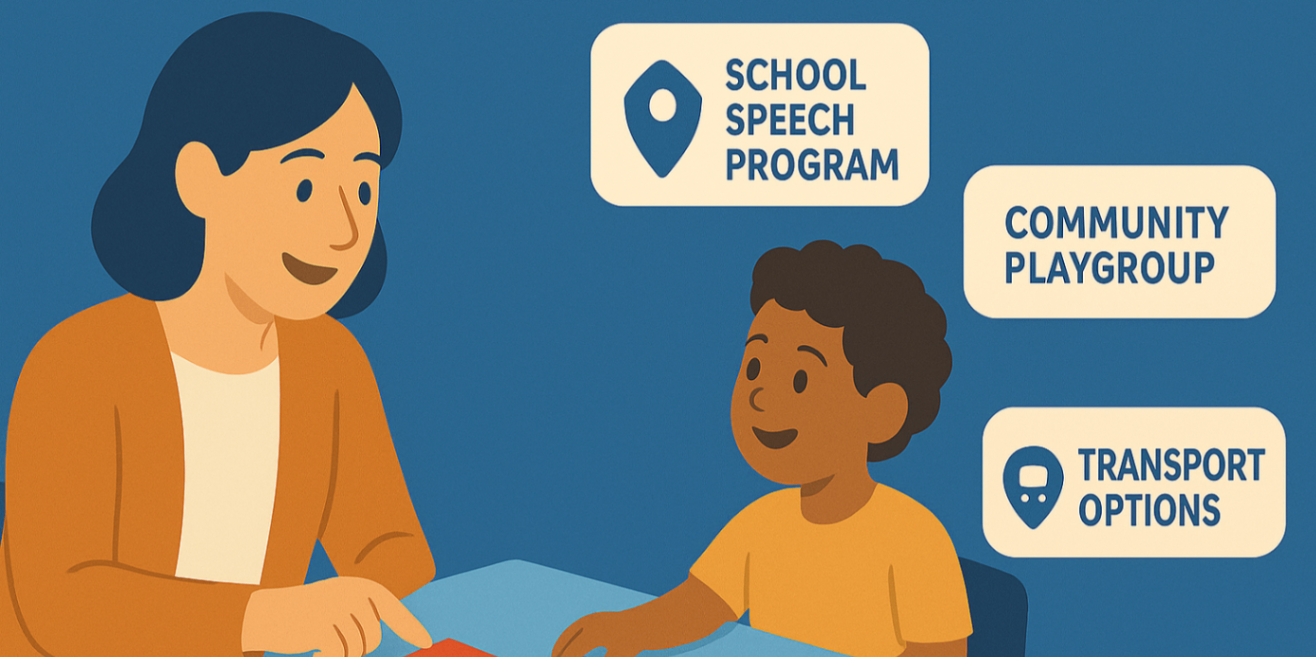
ndis speech therapy in liverpool: a parent’s local guide
21 August, 2025
Latest Update: November 20, 2025
Introduction
Finding the right speech therapist for your child in Liverpool can transform their ability to communicate, connect and flourish in everyday life. With the right support under the National Disability Insurance Agency (NDIA) and the National Disability Insurance Scheme (NDIS), your family can access therapy that fits your child’s needs, your routine and your goals. At daar, our NDIS-registered speech pathologists serve families across Liverpool and surrounding suburbs, offering clinic, home and telehealth options to ensure help is accessible and effective.
Key Highlights
-
Accessing NDIS speech therapy in Liverpool provides tailored support for your child's specific communication needs.
-
Experienced language therapists offer personalised plans to boost communication skills and language development.
-
Services cover a wide range of communication difficulties, including autism, stuttering, and childhood apraxia of speech.
-
You can access care in various settings, including clinics, home visits, and telehealth, for maximum convenience.
-
NDIS funding makes quality speech pathology available and accessible for many families across Liverpool.
-
Individualised therapy plans lead to measurable progress and positive changes in your child's communication abilities.
Understanding Speech and Language Therapy for Children
Speech and language therapy supports children who struggle with sounds, words, sentences or communication. It’s more than pronunciation — it’s about helping your child express themselves, understand others and participate confidently in school and social settings. Whether your child has autism, stutters, or finds it hard to form sentences, these therapies are designed to meet them where they are and build skills for everyday life.
How local families access NDIS speech services
For families in Liverpool, to start with NDIS speech pathology services, you first need to check if your child is able to get help through the program. The NDIS gives money to people with disabilities so they can get the support they need. This can pay for language therapy to help with communication needs. After you get an NDIS plan, you can pick a registered provider in Liverpool to begin the sessions.
Many people ask if speech pathology services can happen at home. You can use your NDIS funding for therapy at home, your child's school, or in a clinic. That way, your child can get support in the place where they feel the most comfortable. It is important to have these needs written in your child's NDIS plan. This helps make sure the funding matches what your family wants and needs for your child.
Understand typical funding routes, evidence and next steps in Speech Therapy for Children — Funding Solutions via NDIS if you’d like help turning that guidance into a plan that suits your child.
Signs a child may need a speech assessment (age-based cues)
Are you worried about your child's language development? There are some signs to look out for that show a speech check-up may help. For toddlers, look if the child does not babble, uses only a few words, or does not answer when you call their name. Preschoolers might have communication difficulties such as finding it hard to make sentences, being hard to understand, or not following easy directions. If you notice any of these, know that early help matters for speech disorders.
When children get older, you might see other problems. School-aged kids may have trouble with reading, writing, or talking with others. These can be caused by language development issues. Some children may have childhood apraxia of speech, where it is hard for the brain to get the mouth muscles to work together for talking. This needs special testing and help. If you spot these signs, the best thing is to get the child checked by a professional. It is the first step to help them get better and do well.
If stuttering is affecting your child’s confidence, this article explains therapy options, outcomes and how NDIS can support treatment — see NDIS Speech Therapy for Stuttering.
Eligibility for NDIS-Funded Speech Therapy in Liverpool
To get funded speech therapy from the NDIS, you need to know who is able to get help. Your child needs to have a long-term disability that makes it hard for them to do normal things each day. The NDIS looks at the child's communication needs and sees if speech therapy can help them reach their goals.
There will be a check to see if your child's condition fits what the NDIS asks for. For children younger than seven, the NDIS Early Childhood Approach can help with delays in their development. Your child may get support, even if there is no formal diagnosis yet. This helps them get support and improve early.
Now, let’s see who can get NDIS help and how things work for each age group.
Who Qualifies for NDIS Speech Therapy?
The NDIS-funded speech therapy rules depend on how old you are and what the disability is. The NDIS has different steps for young kids and for those who are seven years old or more. A language therapist can look at your child's needs. The therapist can give reports to help with your application for support.
For kids younger than seven, the NDIS has the Early Childhood Approach. With this, a child could get help if there is a developmental delay. There does not have to be a formal diagnosis. The goal is to give help early for communication needs and support all areas of growth. Starting is easy if you have a referral form from your doctor or specialist.
For people who are seven and older, there must be proof you have a permanent and big disability. This could be about problems with speech, language, mental health, social skills, or other things. To get approved, show that:
-
The disability will not go away.
-
The disability makes daily life and talking much harder.
-
Help from a speech therapist is needed so that you can do daily things or join in more.
The assessment process: what to bring and what happens at the first appointment
The assessment process for NDIS speech therapy is a full evaluation that is done by speech therapists. During your first visit, the therapist will talk with you and your child. They will go over your child’s history and ask about any worries you have. The therapist will work with you to talk about the goals you want to reach. This meeting helps the therapist get to know your child’s strengths and any problems in a caring way.
It is a good idea to bring documents with you, like reports from doctors, the pediatrician, or the teacher. After this visit, the therapist might say that further assessment is needed to learn more about your child’s needs. This can include tests, watching your child, and activities that feel like play. What the therapist learns during speech pathology will help them write a report and make a plan for therapy that is right for your child.
This guide walks through referrals, evidence and booking options specific to Liverpool families — check How to Access NDIS Speech Therapy Liverpool for practical next steps.
How NDIS Speech Therapy Supports Children in Liverpool
As the NDIS continues to evolve in 2025, speech therapy remains one of the most commonly funded supports for children in Liverpool and surrounding suburbs. Families are increasingly using their plans for:
-
Early childhood intervention
-
Communication development
-
Social-emotional support
-
Autism, developmental delay & language delays
-
Parent coaching and in-home strategies
New NDIA guidance emphasises functional communication outcomes, meaning therapy must show real gains in:
-
Everyday interactions
-
School readiness
-
Community participation
-
Routines at home
-
Social confidence
Sample assessment checklist for Liverpool families
Preparing for your first assessment can feel overwhelming, but having an assessment checklist can make the process smoother. Bringing the right information helps the therapist understand your child's history and current communication skills. This ensures the evaluation is tailored to their individual needs.
Your goal is to provide a complete picture, so the therapist can accurately identify any potential speech disorders and recommend the best course of action. Think about your child's communication at home, at school, and with friends.
Here is a sample table of what you might want to bring or have prepared for your appointment:
|
Document Type |
Details |
|---|---|
|
Medical Reports |
Any reports from your GP, pediatrician, or other specialists. |
|
School or Daycare Reports |
Feedback from teachers about your child's communication in the classroom. |
|
Previous Therapy Reports |
Information from any past speech, occupational, or other therapy. |
|
Your Own Notes |
A list of your specific concerns, examples of speech difficulties, and milestones. |
Steps to Access NDIS Speech Therapy Locally

Accessing local services for NDIS speech therapy in Liverpool is easy if you follow some simple steps. To start, you need a speech pathology assessment from a professional. This assessment shows what your child needs and is also needed for your NDIS application. It will help set the goals for the therapy.
After you get a diagnosis and the needed papers, you can send your information to the NDIS. Once your plan is OK’d, you can pick a registered provider near you. Then, you start making therapy plans. These are set up to help your child grow in confidence and improve their communication skills in a clear, well-planned way.
Here is how you can move through the application, for both children and adults.
How to Apply for NDIS Speech Therapy for Your Child
Starting the application for your child’s NDIS funding means you need to collect the right documents. The process usually begins with a referral form. Your GP or child’s pediatrician will fill this out. You also have to get a detailed speech pathology report. Both of these are important to your application.
These documents need to show your concerns about your child’s speech. They should explain why therapy is good for them. This helps the NDIS see what your child needs and how support can help.
The next steps in the process are:
-
Getting a speech pathology assessment that talks about your child’s speech and how they communicate.
-
Adding reports from doctors or teachers. These describe how your child’s speech issues affect everyday life.
-
Filling out the NDIS Access Request form carefully and making sure all details are right.
-
Sending all these documents to the NDIS for them to check.
Discover how tailored sessions can boost participation and school confidence in NDIS Speech Therapy Liverpool — Personalised Support for Kid.
Application Process for Adults Seeking NDIS-Funded Therapy
For adults, the process to apply for NDIS-funded speech therapy is much the same as it is for others. The focus is on how problems with communication can affect your daily life, your work, and how you get along with other people. Your individual needs are very important in this assessment. You might have had a condition your whole life, or you could have only just developed a disability.
You will need a referral form from a specialist and a full assessment from a speech pathologist. These papers must clearly show your communication needs. They also should say how speech therapy can help you reach your own goals. The NDIS will look over this information to see if you are able to get funding.
Key documents for an adult’s application include:
-
A full speech pathology report that shows your disability and describes how it affects you.
-
Statements from your doctors or a specialist that give medical proof about your condition.
-
A finished NDIS Access Request Form that lists your goals and the supports you need.
Finding the Best NDIS-Approved Speech Therapists in Liverpool
 Once your NDIS plan gets approved, you will need to find good speech therapists for your child. In Liverpool, there are many choices. It is best to look for those who are NDIS approved. This way, you will know they follow the quality and safety rules set by NDIS.
Once your NDIS plan gets approved, you will need to find good speech therapists for your child. In Liverpool, there are many choices. It is best to look for those who are NDIS approved. This way, you will know they follow the quality and safety rules set by NDIS.
When searching for Liverpool speech therapy providers, think about their experience and qualifications. Check how they do speech therapy. The team should have the right skills. It also helps if they can connect with your child and understand your family’s needs.
Here are some tips that can help you choose a provider and know what to look for.
Choosing a local provider: what to ask and how to compare
When you look for a local language therapist, it is good to do some research and compare a few options. Try to find someone who has a solid background in speech pathology and has worked with the same issues as your child before. Make sure to ask about their qualifications and how they make therapy plans.
Check if they use methods that are backed by research. Ask how they get families to be part of the process. A good language therapist will be open and ready to answer anything you want to know. You should feel that their way of working fits your family's values and your child's needs.
Here are a few questions you can ask possible providers:
-
Are your therapists certified with Speech Pathology Australia?
-
What experience do you have with my child's specific communication disorder?
-
How do you measure progress and report back to families and the NDIS?
-
What are your options for service delivery (clinic, home, telehealth)?
Clinic, home, school and telehealth
Accessing speech therapy can work for your child in different places to fit what they need. Clinics give a set way to learn with language therapists who know how to help with many speech disorders. Home visits let your child get support at home. This helps with language development in the flow of everyday life. Schools use speech pathology services that help improve communication skills with other people. Now, telehealth lets you do therapy sessions from anywhere. This makes sure that speech therapy can happen on a regular basis, so your child can keep getting better.
Measuring progress: milestones, GAS and NDIS-ready reporting
Tracking how a child grows in speech therapy is important. Key milestones include working on communication skills and language development. When you use Goal Attainment Scaling (GAS), it helps you and the caregiver to see if the child is meeting their own special goals. GAS lets you check if the therapy plans are meeting the child's individual needs.
Reporting that works with NDIS helps everyone keep on top of set goals. It also shows the positive impact of what the therapy can do. This way, you know how well the child is doing over time.
This step-by-step way does not just help with communication difficulties. It will change for issues like childhood apraxia of speech or autism if needed. That means the plan can grow with the child and give good support as they go about everyday life.
Getting help with NDIS speech therapy in Liverpool can be a good experience for parents who want the best for their children. You need to know the rules to see if they can join, learn about the check-up steps, and find the right therapists. This will help your child get the care they need. If you know what to do and ask questions when needed, you can help your child grow and improve their communication skills.
Book your appointment now and get practical next steps for NDIS speech therapy.
Frequently Asked Questions
Can my child receive NDIS-funded speech therapy at home in Liverpool?
Yes, NDIS funding can be used for home visits. Many speech therapists in Liverpool work in a range of settings to help meet your child's communication needs. These therapy sessions at home help your child learn in a place they know and feel good in.
How do I know if a therapist is NDIS approved in Liverpool?
To make sure that the language therapist you choose is approved, you should see if they are a registered NDIS provider. You can ask the Liverpool speech therapy clinic about this. Another way is to use the NDIS Provider Finder tool. Registered speech therapists have to follow high quality and safety rules in speech therapy and speech pathology. This helps you get good help for your needs in Liverpool.
What are parents saying about NDIS speech therapy services locally?
Parents in Liverpool often say that language therapy has a good effect on their child’s speech and how they talk to others. Many people like the way therapy plans are made just for their child. They also like the caring style of therapy. People notice a real difference in their child’s confidence and how well they can speak and understand others. This shows the positive impact language therapy can have on communication skills in Liverpool.
.svg)

















